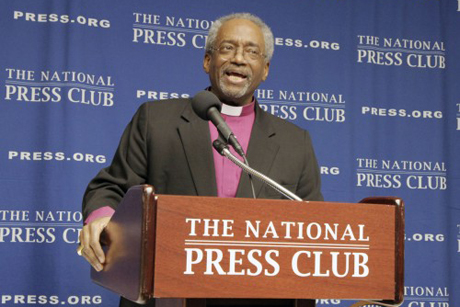
(Article adapted from Anglican Communion News Service)
The Presiding Bishop of the Episcopal Church in America, the Most Revd Michael Curry, has said that the replacement of Judeo-Christian values with the “idol of the self” is a “formula for human self-destruction” and said that the love of God was about the “sacrifice of self-centred interest for the good of the other.”
Bishop Curry made his remarks to journalists and other invited guests at a Newsmakers event at the National Press Club in Washington, DC.
Bishop Curry read a quotation from Not in God’s Name: Confronting Religious Violence, a book by Britain’s former Chief Rabbi, Jonathan Sacks. “The old marriage of religion and culture has ended in divorce. Today the secular West has largely lost the values that used to be called Judeo-Christian. Instead it has chosen to worship the idols of the self: the market, consumerism, individualism, autonomy, my rights, and whatever works for you. The golden calf of the self has been raised by the Children of Israel in the wilderness again.”
Bishop Curry added: “I think he’s right. And that golden calf, that idol of the self, may well be the most destructive reality in human society. Self-centeredness, selfishness, call it what you will, frankly is a cancer that can destroy us all and that left unchecked will destroy the planet.”
Invoking the theological tradition of Saint Augustine of Hippo, Bishop Curry spoke of original sin as “that ubiquitous reality of self-centredness, that hubris, that false pride that sees me as the centre of the world and you as the periphery. . . And that is a formula for human self-destruction.
“We must learn to live together as brothers and sisters or we will perish together as fools,” he said.
Those words were originally said by the Revd Martin Luther King Jr in a speech at Saint Louis, Missouri, in 1964, but “serve as a defining quote for the 21st century,” Curry said.
Bishop Curry quoted further from Jonathan Sack’s book, saying that “the Rabbi is right on target and I think we must engage that.” In the book, Rabbi Sacks argues that extremism can be found in Judaism and Christianity as well as Islam; and that the silence of the mainstream religious voices “allows the louder voices to become the face of religion,” Bishop Curry said.
He then moved onto the Gospel accounts of Jesus’ response to the question about the greatest commandment when he said: “‘Love the Lord your God with all your heart and with all your soul and with all your mind.’ This is the first and greatest commandment. And the second is like it: ‘Love your neighbour as yourself.’ All the Law and the Prophets hang on these two commandments.”
Bishop Curry described this response as “most extraordinary”, adding: “Jesus just said everything that is in that Bible is straining and pointing to love of God and love of neighbour. Everything in the mosaic edifice pointing to love of God, love of neighbour.
“Religion is completely and totally about the love of God and love of neighbour. And if it is not about love, it is not about God. Period. Exclamation point. . . That is what Jesus was saying.”
And he warned – particularly with Valentine’s Day coming up – that it was easy to “schmooze love into sentimentality” but pointed out that Jesus’ teaching about love in Matthew 22 was made in Holy Week.
“Jesus had that conversation about the time that he had made the decision that he might have to sacrifice his own life for the cause of love in this world. That’s when he is talking about love.
“And in John’s gospel, almost all of Jesus’ teachings about love are at the Last Supper. That’s not an accident.
“Love, the love of God, is about the sacrifice of self-centred interest for the good of the other, for the good and the well-being of others, for the common good. That’s the love of God.”

